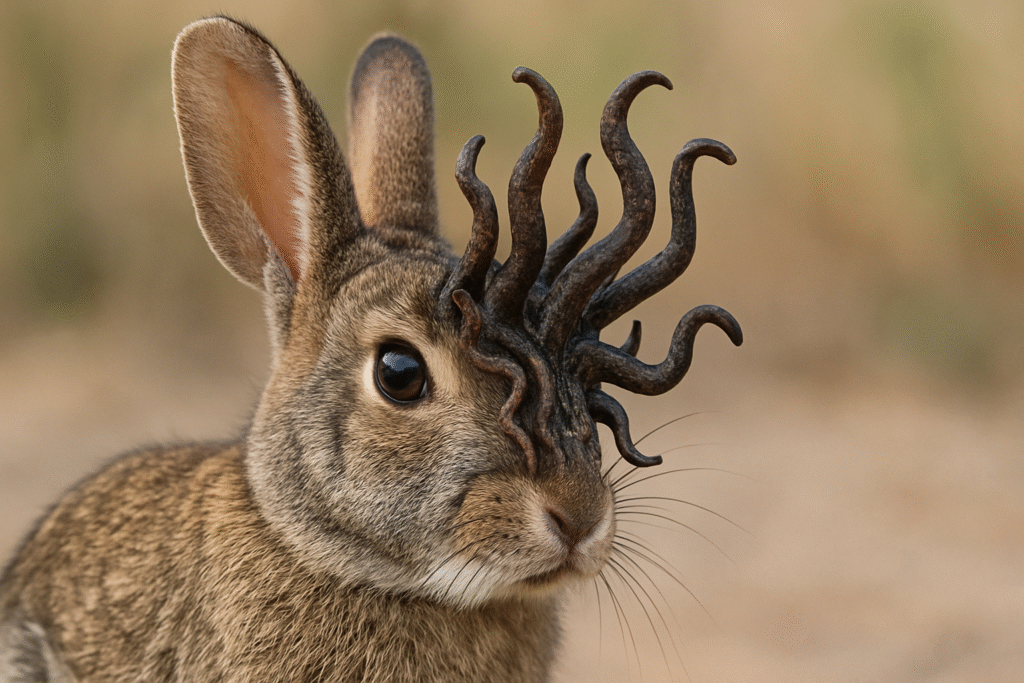In recent weeks, the internet has been captivated by images and videos of rabbits with tentacles—an unusual and slightly eerie sight that’s been trending in the United States, especially in Colorado. These so-called “zombie rabbits” or “Frankenstein rabbits” have been spotted with bizarre horn-like or tentacle-shaped growths sprouting from their faces. While the photos might look like something out of a science-fiction movie, the truth behind Colorado rabbits with tentacles is both fascinating and real.

The strange growths are caused by the cottontail rabbit papillomavirus, also known as the Shope papilloma virus. This rabbit virus triggers the formation of keratinous wart-like nodules that can elongate into protrusions resembling horns, tentacles, or antlers. Transmission occurs mainly through insect bites—from mosquitoes, ticks, and fleas—making the virus more common in warmer months. While the sight can be unsettling, wild rabbits usually survive unless the growths interfere with eating or vision.
However, for domestic rabbits, the stakes are higher. When infected, these bunnies with tentacles may develop severe or even cancerous lesions. This is why the Colorado rabbits tentacles virus trend should matter to pet owners—especially those who travel with their pets. If you’re bringing your rabbit along on a trip, being aware of this condition can help you take precautions and keep your furry friend safe.
The Link Between Tentacle Rabbits and the Jackalope Legend
Interestingly, rabbit papillomavirus infections aren’t new. They were first documented in the 1930s and have been studied for decades, even contributing to early cancer research. Many historians believe that sightings of infected wild rabbits helped fuel the enduring American folklore of the jackalope—a mythical horned rabbit often featured in Western tall tales.
Today, thanks to smartphones and social media, these unusual growths are making headlines across the country, from The Washington Post to DailyMail, drawing attention not only to wildlife health but also to responsible pet care. If you’re curious about other strange animal myths and travel connections, check out our guide on pet travel myths and facts for more insights.
Pet Travel Safety: Why Rabbit Owners Should Pay Attention
If you’re traveling with rabbits, especially through regions like Colorado where zombie rabbits have been reported, you’ll want to take extra precautions.
When traveling, always keep your rabbit in a secure pet carrier for long trips to prevent contact with wild rabbits or insects that could spread the virus. Avoid letting your pet roam freely in areas known for wild rabbit populations. If you notice any unusual lumps, warts, or tentacle-like growths on your pet, seek veterinary care during travel immediately. Domestic rabbits infected with the Shope papilloma virus require prompt treatment to prevent serious complications.
It’s also wise to inspect your pet’s travel gear—carriers, harnesses, bedding—for ticks or fleas after any outdoor exposure. For more preventive strategies, see our article on how to protect pets from parasites while traveling.
Why the “Zombie Rabbit” Trend Has Gone Viral
The phenomenon of tentacle rabbits has captured the public imagination because it blends elements of mystery, folklore, and science. The term “zombie rabbits in Colorado” makes for a striking headline, and the visuals are undeniably attention-grabbing. But beyond the internet buzz, this is a reminder of how wildlife health issues can intersect with pet safety—particularly in the pet travel niche.
If you’re new to traveling with rabbits or other small animals, we recommend reading our complete rabbit travel safety checklist before your next trip.
Frequently Asked Questions
Are rabbits with tentacles real?
Yes. The growths are caused by the rabbit papillomavirus, specifically the Shope papilloma virus, and have been documented in wild rabbit populations for decades.
Can humans catch the rabbit virus?
No. The virus only affects rabbits and is not transmissible to humans or other animal species.
Is this the same as a jackalope?
Not exactly—but many believe that infected rabbits inspired the jackalope myth.
Do wild rabbits die from the virus?
Not usually. Wild rabbits often survive, but if the growths block eating or vision, it can be fatal.
Should I be worried when traveling with my rabbit?
Yes—take precautions, especially in areas where Colorado rabbits with tentacles have been reported. Keep your rabbit away from wild populations and check for signs of infection. You can find more details in our guide to rabbit health during travel.
Final Thoughts
The rise in sightings of bunnies with tentacles—from Frankenstein rabbits to so-called zombie rabbits—is a viral trend that mixes curiosity, folklore, and genuine animal health concerns. While the condition is not a threat to humans, it’s a reminder to be proactive about pet safety during travel.
By keeping your pet protected from potential exposure to the rabbit papillomavirus, using secure carriers, and staying aware of regional wildlife health alerts, you can ensure your rabbit’s adventures are both safe and memorable. The next time you hear about zombie rabbits in Colorado, you’ll know the truth behind the headline—and how to keep your furry companion safe on the road.
